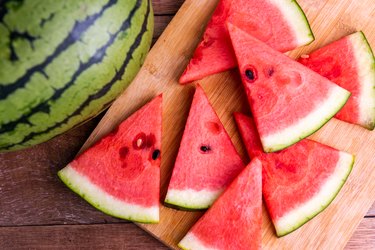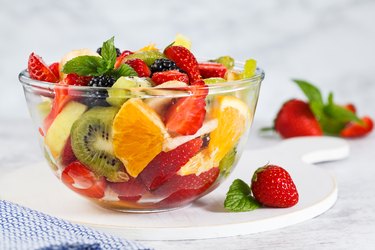
Beans are infamous for inducing farts — for this, they even have their own playground song. But other snacks can lead to flatulence and gastrointestinal (GI) discomfort, so knowing the foods that give you gas (plus anti-gas foods to eat instead) can help you ease these symptoms.
First, let's clear the air: Although it's commonly associated with shame, passing gas is a normal part of the digestive process, says dietitian Suzie Finkel, RD, the founder of Well Digested.
Video of the Day
Video of the Day
"Gas is predominantly produced by bacteria that live in our large intestine (colon) when they are feeding on food particles passing through," she says. "Bacteria produce more gas when they are digesting — aka fermenting — specific types of carbohydrates, such as plant-based fiber and sugars."
Farts, then, can be a signal that your system is in good working order.
"Moderate amounts of gas are a normal sign of digestion and can actually signify feeding good bacteria with the things they love to thrive on," Finkel says, adding that bacteria most enjoy plant-based fiber from foods like nuts, seeds, beans, whole grains, fruits and vegetables. "When we eat well-balanced diets rich in these beneficial carbohydrates, we often get gassy."
Besides beans, there are a number of foods that may make you pass more gas than you're used to, especially if you're introducing them into your diet for the first time. But that's not a reason to stay away from them — read on to learn about what foods cause gas and how to incorporate them into an anti-gas diet that gives you minimal discomfort.
1. Onions and Garlic
Onions and garlic can make you gassy because they have high concentrations of fructans, a type of carb that's tough to digest, Finkel says. Fructans can be hard to avoid because so many recipes rely on onions and garlic for flavorful cooking.
Fructans are a type of FODMAP, which stands for Fermentable Oligosaccharides, Disaccharides, Monosaccharides and Polyols. FODMAPs are specific types of carbs that humans don't digest particularly well and are a common culprit of gas — especially for people with irritable bowel syndrome (IBS), small intestinal bacterial overgrowth (SIBO), lactose intolerance and other GI sensitivities, Finkel says.
Try this instead: The good news is that cooking helps break down the compound in these gas-producing vegetables. Because the fructan content is water-soluble, cooking them in an oil-based dish is a great way to get some flavor without the fructans, per Monash University.
After cooking them in something like a stir-fry, you can remove the onion and garlic pieces to reduce their effect on your digestive system.
If you're finding that your sensitivity to onions and garlic is particularly severe, try experimenting with swapping onions and garlic for a mirepoix of fennel and carrots, which will add flavor but be easier to digest, says Christy Brissette, RD, founder of 80 Twenty Nutrition.
2. Cruciferous Vegetables
Broccoli, cabbage and Brussels sprouts can be tough on some stomachs. What gives you gas is the raffinose in cruciferous veggies — this is another type of sugar that can be tough to break down and may sometimes leave you feeling bloated and in pain, Brissette says.
Try this instead: Cooking can help lessen the blow of these types of veggies, too, as doing so can break down raffinose.
If you experience cramping and other stomach pains after eating these gassy foods, you may want to cut back on how much you eat at a time — Brissette says to stick to one cup per serving max, and consider getting your greens from easier-to-digest, anti-gas foods like lettuce, peppers, beets and carrots.
3. Starchy Vegetables
Starchy vegetables that cause gas include potatoes, sweet potatoes and corn, per the International Foundation for Gastrointestinal Disorders (IFFGD). That's because they produce gas as they break down in your large intestine.
Try this instead: If starchy veggies are among the foods that give you gas, try a mashed or cooked lower-starch alternative anti-gas food, like jicama, according to Michigan State University.
4. Legumes
Admittedly, beans fall into the legume category. But they aren't the only gas-producing plants in this family — other legumes like peas and lentils can also lead to excessive farting, according to the IFFGD.
These plants contain insoluble fiber, which doesn't dissolve in water and is poorly fermented, per the IFFGD. Translation: It's the type of fiber that's more likely to cause digestive issues like gas, bloating and abdominal pain.
Try this instead: If these foods make you fart the most, there are some strategies you can use to reduce their flatulence-inducing properties. Per the Mayo Clinic, here's how to optimize legumes for your diet to stop gas:
- Soaking beans before cooking allows water to mop up some of the gas-producing substances. Be sure change the water several times while soaking, and don't use that same water to cook the beans.
- Opt for canned beans, which are more broken down and digestible.
- Slow-cook beans until they're tender.
- Take a digestive aid like Beano to reduce gas.
5. High-FODMAP Fruits
Now that we've covered veggies, you may be wondering if there are fruits that cause gas. And indeed, some fruit does cause gas.
Not all fruits will bring on the fumes, but high-FODMAP options that contain lots of fructose or sorbitol can, Finkel says. Here's which fruits cause gas:
- Apples
- Pears
- Mangoes
- Cherries
- Apricots (dried apricots do cause gas, too)
- Figs
- Blackberries
- Raspberries
- Peaches
- Dried fruit
Fruits with a high concentration of fructose can lead to gas, abdominal pain and diarrhea if your system isn't digesting properly, according to the Mayo Clinic. And fruits and other foods rich in sorbitol — a type of sugar alcohol that naturally occurs in some plants — can't be fully digested, which can also lead to gas, per the Cleveland Clinic.
Try this instead: If you're finding certain fruits are problematic, try noshing on low-fructose options instead, Brissette says. The best anti-gas foods include fruits like:
- Cantaloupe
- Bananas
- Strawberries
- Oranges
- Pineapple
Once you're comfortable, you can slowly introduce the high-fructose varieties back into your eating routine, which could help you find your sweet spot to avoid fruit gas.
"Sometimes it's all about the amount. You'll find you can do an apple a day, but not a big bowl of cherries, too," Brissette says.
Does Pineapple Cause Gas?
Pineapple lovers, rejoice: The fruit is low in fructose, which means it's generally gut-friendly from a FODMAP perspective and thus shouldn't lead to much gas, bloating or other GI symptoms, according to the University of Virginia Health System.
6. Cucumbers
This one might come as a surprise, but cucumbers can cause gas and bloating for some people, namely those who are sensitive to a chemical compound called cucurbitacin.
The amount of cucurbitacin various from cuke to cuke, according to the Oregon State University Extension Service (OSU), and it's responsible for that bitterness you sometimes get when you bite into the fruit (yep, cukes are fruits!).
Cucurbitacin can also be found in wild pumpkins, melon, watermelon and squash, according to UC Davis.
Try this instead: Wild cucumbers tend to have the highest amount of cucurbitacin, per OSU, so stick to store-bought (look for the "burpless" label, which indicates low levels of cucurbitacin). You can also try peeling your cukes, since the compound is most concentrated in the peel and just beneath the skin, and steer clear of the leaves, stems and roots.
And if you notice that every time you eat cucumber you experience gas, bloating, stomach upset or diarrhea, consider avoiding the fruit altogether.
7. Sugar Alcohols
"With a lot of my clients dealing with bloating or gas, one of the most common causes is sugar alcohols or any ingredient that ends in '-ol,'" Brissette says.
Sugar alcohols are often added to protein powders, bars, packaged foods marked "sugar-free" and other so-called "diet" foods to reduce their calorie counts. Xylitol, sorbitol, maltitol and erythritol are all examples of sugar alcohols, and they're often used as sugar substitutes and to add bulk and texture to foods, according to the Cleveland Clinic.
Our bodies don't digest all parts of the sugar alcohol, Brissette says. The undigested parts travel to the colon, where they can "generate some gas and sometimes cramping or abdominal discomfort."
While some bodies do just fine eating sugar alcohols, others — especially those with GI issues like IBS, Crohn's disease or ulcerative colitis — experience certain uncomfortable effects, including gas, bloating and diarrhea, per an October 2016 study in the International Journal of Dentistry.
Try this instead: The study found that xylitol tends to be better tolerated than other sugar alcohols, so if you often reach for foods containing sugar alcohols, check the ingredient list for xylitol. Brissette also suggests looking for products sweetened with stevia, which are also known to cause less bloat and gas.
You can also make bars at home using fruit, nuts and seeds, she says.
Try These Recipes
8. Dairy
About 30 million American adults have some amount of lactose intolerance, according to the U.S. National Library of Medicine. And as we get older we're likely to experience more difficulties digesting dairy.
People with dairy intolerance can't fully digest lactose, a type of sugar found in milk. Usually this happens because the small intestine doesn't produce enough lactase, the enzyme responsible for breaking down milk, per the Mayo Clinic. People with low levels of lactase can still digest milk, but if their levels are too low, they might experience symptoms like nausea, bloating, stomach cramps, gas and diarrhea.
Try this instead: While most people with lactose intolerance don't have to give up all dairy products to manage their condition, it has become increasingly easier to find alternatives thanks to the surge in non-dairy milk alternatives available on the market today. For every dairy product, chances are there's also a non-dairy version of the food that's good for gas, Brissette says.
"Just make sure to choose one that's fortified with calcium and vitamin D to get the health benefits of milk," she says.
You can also talk to your doctor about popping a lactase pill before chowing down on dairy-containing foods.
9. Whole Grains
Whole grains are your friend: They keep your digestive tract functioning well, stabilize blood sugar and provide fiber, which can help with a host of conditions, including weight management, per the Mayo Clinic.
A study by the National Food Institute, Technical University of Denmark discussed in a January 2019 article in Gut found that when adults with overweight replaced refined grain products with whole grain varieties, they lost weight, ate less and experienced reduced inflammation in their bodies.
But fibrous whole grains and other foods with fiber (even the ones that don't cause gas normally) can be a shock to your system, especially if you add them to your diet too quickly. "Your body needs to acclimate because fiber creates bulk and moves things through your system quickly," Brissette says.
Try this instead: She recommends introducing fiber-rich foods gradually and increasing your water intake as you do in order to keep things flowing smoothly. Otherwise, it's possible to have dry fiber sitting like a rock in your colon, which can be the cause of that gas and bloating.
10. Foods Containing Gluten
While you'll spot the gluten-free fad in popular eating styles like Whole30 and the keto diet, foregoing gluten is more than just a trend: It's essential for the 2 million Americans with celiac disease, an immune disorder triggered by gluten that causes damage to the small intestine, according to the National Institute of Diabetes and Digestive and Kidney Diseases.
What's more, "there's another subset of people who seem to have non-celiac gluten intolerance," Brissette says. "When they have foods with gluten, they feel lethargic, get headaches and experience gas, bloating, constipation and diarrhea."
What glutinous foods give you gas? Brissette says these products can be to blame:
- Wheat bread and pasta
- Rye
- Barley
- Seitan
- Pastries or other products with wheat flour
Try this instead: If you have symptoms every time you eat gluten-containing foods, Brissette recommends switching to gluten-free foods like quinoa or brown rice for two to three weeks.
"If you replace gluten foods with those items and the gas and bloating doesn't get better, you know something else is going on," she says.
Tip
If your gastrointestinal symptoms persist despite cutting out gluten, visit your doctor to determine the root cause of your digestive discomfort.
11. Fried Foods
Many people find that greasy meals leave them feeling less than stellar after the food's all gone. "High-fat foods are not gas-forming on their own, but they do tend to slow down digestion so that food has more time to ferment in the colon," Finkel says.
Indeed, greasy, fried foods commonly cause gas because they're full of fat, and fat is the most slowly digested macronutrient, per an October 2017 study in the International Journal of Molecular Medicine. Because fatty food digests slowly, it spends more time lingering in your GI tract, which can lead to those not-so-fun symptoms like gas, bloating and diarrhea.
Put simply, "if a heavy, greasy meal feels like a rock in your stomach, that's kind of what's happening," Brissette says.
Try this instead: "Reducing fat can prevent food from hanging around so you feel lighter and more energetic," Brissette says. So instead of ordering the deep-fried fish, opt for lower-fat cooking methods like pan-searing or baking. And ask for fatty sauces and butter on the side to practice portion control.
12. Candy
Sucking on a hard candy can lead you to swallow extra air, which can give you gas, according to the Mayo Clinic. Candy can also contain artificial sweeteners and sugar alcohols that likewise lead to flatulence.
Try this instead: If you're in the mood for a sweet, opt for a treat that doesn't require sucking. You can also avoid gas-inducing sugar alcohols by sticking to stevia-sweetened products, because stevia doesn't make you fart as much as other sugar substitutes, Brissette says.
13. Gum
The same goes for gum — all that chomping can cause you to swallow more air than usual, which can leave you gassy, according to the Mayo Clinic. Gums can also contain artificial sweeteners and sugar alcohols that may add to your flatulence.
Try this instead: Skip the gum and instead opt for another satisfying food that doesn't cause gas from excessive chewing.
14. Sugary Drinks
Food isn't the only thing that makes you fart — sipping certain beverages is what gives you bad gas, too.
This one might seem obvious, but there are more reasons these beverages cause gas than you may think. Carbonated drinks like cola, beer and sparkling water trap air in your digestive system, causing belching and gas, per the Mayo Clinic.
What's more, regular soda and many fruit juices are loaded with gas-causing fructose, and diet drinks serve up sugar alcohols that can also lead to bloat.
Try this instead: The concentrated amounts of syrups in these drinks combined with the carbonation can wreak havoc on your digestive system, so try sticking to plain water or water infused with fruit or herbs as much as possible.
"I have quite a few clients who didn't need to touch their diet and found that switching to still water is enough," Brissette says.
Tips for Reducing Gas and Discomfort
"Gas is good," Finkel says. Still, if gas is causing you pain or continually making meals uncomfortable, it might be worth seeking some help. Working with a registered dietitian is a good place to start, especially because you want to address the root of the problem.
Here are some other tips to help you banish gas:
1. Try a Supplement
"Some people do very well with a digestive enzyme," Finkel says, noting that both Beano and Bean-zyme may help reduce the gas bubbles that heavy eating can lead to. If you know you're about to sit down to a large serving of chili, for example, you can take a supplement beforehand to ease your stomach.
Finkel also recommends fresh ginger and peppermint tea, which she says can be effective in reducing those gas bubbles.
Tip
Remember, the FDA doesn't require supplements to be proven safe or effective before they are sold, so there’s no guarantee that any supplement you take is safe, contains the ingredients it says it does or produces the effects it claims. Talk to your doctor before trying one to make sure it's right for you.
2. Focus on Portion Control
You might be able to tolerate certain foods better if you eat them in smaller, less frequent quantities.
"Many people, even those with life-long IBS, can tolerate many FODMAP-containing foods in smaller amounts," Finkel says. She says her clients can enjoy a tablespoon of pistachios versus a cup, or a few pieces of cooked cauliflower versus a plate of cauliflower rice.
"Everyone's tolerance is different, so it's good to test out your personal digestion threshold of FODMAP foods with a dietitian," Finkel says. "You may be surprised [to find] you tolerate a certain food just fine even though it's higher in FODMAPs."
3. Slow Down
"Upper GI gas, which includes burping excessively, can be related to SIBO and upper GI bacterial fermentation, but more often it's just air bubbles," Finkel says.
"Breathing patterns and the way you take in air when you eat and talk can have a huge impact. Eating slowly, chewing well and working on calm, deep breathing throughout your day can help," she says. "There are many physical therapists, particularly pelvic floor therapists, who assist with breath work to see if you are using your diaphragm and abdominal muscles correctly for breathing."
4. Check in With Your Doctor
Sometimes, gassiness can be cause for concern if it's accompanied by other GI issues. According to the Mayo Clinic, visit your doctor if you also have symptoms like:
- Bloody stool
- Change in consistency of stools
- Change in frequency of bowel movements
- Weight loss
- Constipation
- Diarrhea
- Frequent nausea or vomiting
Still, if it's just gas that's making you uncomfortable, don't hesitate to check in.
"There's nothing embarrassing about bringing it up with your doctor," says Jennifer Katz, MD, a gastroenterologist at Montefiore Medical Center. "Most people who complain about excess gas don't necessarily have more than everyone else. They're more sensitive to it."
And a registered dietitian or your doctor can help you zero in on the offending food to address that sensitivity. They can also help determine if something else is to blame for your symptoms.
- Monash University: "Cooking with onion and garlic- myths and facts"
- Mayo Clinic: "Fructose intolerance: Which foods to avoid?"
- International Journal of Dentistry: "Gastrointestinal Disturbances Associated with the Consumption of Sugar Alcohols with Special Consideration of Xylitol"
- U.S. National Library of Medicine: "Lactose Intolerance"
- Mayo Clinic: "Lactose Intolerance"
- Gut: "Whole grain-rich diet reduces body weight and systemic low-grade inflammation without inducing major changes of the gut microbiome"
- International Journal of Molecular Medicine: "Effect of diet and individual dietary guidance on gastrointestinal endocrine cells in patients with irritable bowel syndrome"
- Cleveland Clinic: "What You Should Know About Sugar Alcohols"
- International Foundation for Gastrointestinal Disorders: "Foods that May Cause Gas"
- Michigan State University: "Alternatives to potato based sides"
- International Foundation for Gastrointestinal Disorders: "Dietary Fiber"
- Mayo Clinic: "Beans and other legumes: Cooking tips"
- Mayo Clinic: "Whole grains: Hearty options for a healthy diet"
- National Institute of Diabetes and Digestive and Kidney Diseases: "Definition & Facts for Celiac Disease"
- Mayo Clinic: "Gas and gas pains"
- University of Virginia Health System: "Low Fructose Diet"
- U.S. Food and Drug Administration: “FDA 101: Dietary Supplements”
- Oregon State University Extension Service: "Cucumber bitterness explained"
- Colorado Integrated Food Safety Center of Excellence: "Cucumbers"
- UC Davis: "Bitter food but good medicine from cucumbers"
Is this an emergency? If you are experiencing serious medical symptoms, please see the National Library of Medicine’s list of signs you need emergency medical attention or call 911.


